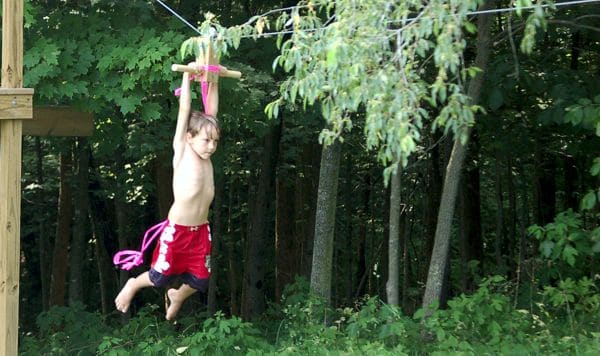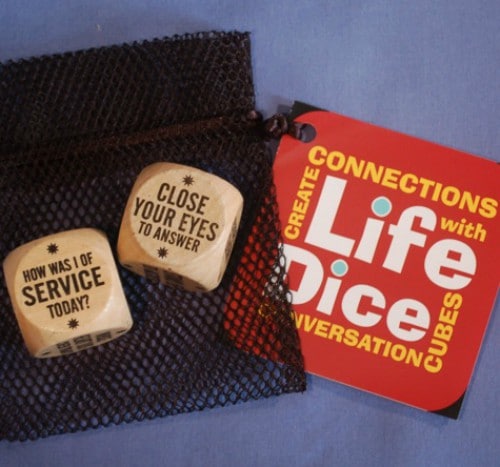
When your kids trust you, it is easier for them to take the risks necessary to develop courage and become brave. Here’s how it works:
There is a difference between being brave and having courage. When you are brave, you are not afraid. To have courage is to feel the fear, but to do what needs to be done anyway because the goal is worthwhile. You can’t become brave without first having courage, and trust is a big part of that step.
How to Develop Courage:
Imagine your child is standing at the end of a diving board for the first time. How do you help them find the courage to jump? Simply shouting “you can do it” over and over is nice, but there is more you can do, and it can be applied to many situations.
The first thing is to help them focus on the benefits of overcoming their fear. For example, they will become better swimmers. They will have more fun at the pool with their friends. They will learn a new skill. They will be allowed to swim more places and with less supervision. As they focus on the benefits, their courage will increase.
At the same time, help them find reasons to trust that they will be OK. YOU are there to protect them. They can trust you. Point out that there is a lifeguard. Remind them that their friends and siblings have survived (without shaming them for their hesitancy). Remind them of similar challenges they have faced and ended up enjoying. Yes, “they can do it.” Trust – in you, in the situation, and in their own capabilities – will reduce their anxiety, making them more brave. When the benefits outweigh the fear, and the trust outweighs the uncertainty in their mind, then they will have the courage to jump.

Once your child has overcome their fear of something the first time, they gain two other important tools to reduce fear: Experience and Education. Point out to them that every time they do something, they gain experience and they learn more about how to do it better. With Experience, Education and Trust, their fear can eventually disappear completely and they will discover that they are Brave!
Think of all of the things that you do without even thinking about it that terrified you the first time – from diving off a diving board to driving a car, or speaking up at a meeting. You are incredibly “brave” when you do any of these things without fear. Likewise, your child will eventually overcome their fears of lots of things, like speaking in class, expressing their opinion, trying a new food, or risking failure at a new skill. Teaching them to look for the benefits and remember the people and things they can trust to keep them safe will speed this process along.
Note: While teaching your child courage, also remind them never do something dangerous on a dare. Impressing their friends is not a benefit. True friends do not want them to get hurt.
“Whatever you do, you need courage. Whatever course you decide upon, there is always someone to tell you that you are wrong.” – Ralph Waldo Emerson

Meet a Courageous Cardinal
This article was adapted from the C page of our Animals Building Character Coloring and Activities Book. Each letter is accompanied by a charming picture and activities that help kids understand the virtues they have within themselves.

The Courage to Share
It takes courage to share our true thoughts and feelings. That is one of the reasons why dinner conversations with our kids often devolve into grunts and one-word answers. Our Life Dice game can help with that by taking the focus off of them and placing it in the fun of the game, and by shifting the locus of control from you, the questioner, to them, the ones holding the dice.
The idea is simple: There are two wooden dice. One has six questions, like “What did I learn today?” or “Whose Heart did I Cheer?” The second die is where the fun comes in. It provides six different ways to answer, from singing your answer to closing your eyes, to passing the question on to someone else.
Together, they add just enough silliness to make coming up with an answer a fun game rather than an obligation imposed by someone else.
They can even be used as ice breakers for groups of youth or adults. Finding the courage to share your true self is a challenge that never ends.

Are YOU ready to be courageous?
For adults, leaving our comfort zone is not about jumping off of diving boards or driving cars. It is about discovering new things about ourselves. As parents, the more we understand our own emotions, the better we will be able to help our children handle theirs.
The Secret of Emotions is an excellent place to start. It draws a connection between our emotions and the virtues we are trying to develop in ourselves and in our children. It is a quick read, but it isn’t for the faint of heart.
As one reviewer said:
“This is probably the most thought-provoking book I’ve ever read. I’m not sure I wanted to dig this deep, but dig I did. The Secret of Emotions will stun and amaze.” – Shawaii

